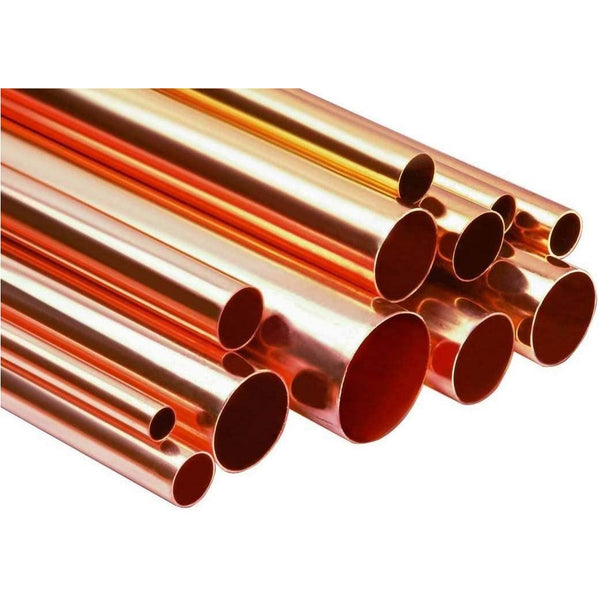Checking Out the Diverse Applications of Copper Products in Modern Industries
Copper items have established themselves as essential components throughout a myriad of modern-day industries, mainly as a result of their remarkable conductivity, malleability, and resistance to deterioration. From boosting the performance of electrical systems to playing a vital duty in renewable resource innovations, the convenience of copper appears. Its recyclability positions it as a sustainable selection in manufacturing and electronics. As industries increasingly prioritize development and sustainability, the varied applications of copper warrant a closer exam, specifically regarding their possible effect on future environmental methods and technical innovations.
Electric Applications of Copper
Copper is an essential product in the electrical sector, representing approximately 60% of the complete demand for non-ferrous metals globally - Copper Products. Its exceptional electrical conductivity, which is virtually two times that of aluminum, makes it the recommended option for a vast range of electric applications. From wiring systems in commercial and household structures to high-voltage power transmission lines, copper ensures efficiency and reliability in electrical power shipment
Along with circuitry, copper is important to the manufacturing of electrical parts such as motors, generators, and transformers. These elements utilize copper's thermal conductivity and pliability, crucial for warm dissipation and effective performance. Copper's resistance to corrosion boosts the life expectancy and resilience of electric systems, making it a cost-efficient solution in the long term.
The growth of renewable resource sources, such as solar and wind power, has actually additionally raised the demand for copper in electrical applications. As industries shift towards lasting power options, copper's role becomes also more crucial. On the whole, the adaptability and efficiency qualities of copper strengthen its condition as a cornerstone product within the electrical field, driving development and effectiveness throughout different applications.
Pipes and Piping Solutions
In modern pipes systems, the option of materials dramatically affects both capability and durability. Copper has actually become a preferred alternative because of its unique properties, consisting of corrosion resistance and antimicrobial features. These features make certain that copper piping stays secure and resilient for transporting drinkable water, an essential factor to consider in residential and business applications.
One of the key advantages of copper in plumbing is its capacity to hold up against heats and pressures, making it ideal for a range of applications, from warm water systems to home heating and cooling networks. In addition, copper's adaptability allows for easier installation in complicated piping layouts, minimizing the danger of leakages and failings.
One more noteworthy benefit is copper's long lifespan, frequently surpassing half a century with proper maintenance. This durability not just minimizes replacement expenses but additionally adds to sustainable practices by decreasing waste. Furthermore, copper's recyclability straightens with contemporary environmental standards, advertising a round economy within the pipes sector.
Copper in Renewable Power
The adaptability of copper expands beyond pipes applications, playing an essential role in the sustainable power market. In solar panels, copper is used in solar cells and circuitry, helping with efficient power conversion and transmission.

In addition, as the worldwide demand for electrical automobiles (EVs) rises, copper's function in battery systems and billing framework ends up being even more substantial. The product's capability to carry out electricity effectively is integral to the performance of EV batteries, improving range and charging speed.
Copper's Function in Electronic devices
Electronic devices making depends greatly on copper's extraordinary properties, especially its high electric conductivity and thermal efficiency. These characteristics make copper a suitable selection for a large range of electronic elements, consisting of connectors, circuit boards, and electrical wiring. The steel's capacity to effectively send electrical signals guarantees minimal power loss, which is crucial in high-performance digital tools.
Additionally, copper's thermal conductivity plays a considerable duty in warmth dissipation, safeguarding delicate components from overheating. This is specifically important in contemporary electronic devices, where compact layouts result in raised heat generation. Copper is likewise preferred for its malleability and ductility, enabling it to be quickly shaped right into complex designs that meet the needs of innovative digital applications.
With the increase of consumer electronic devices, their website telecoms, and electric lorries, the demand for copper in the electronics field remains to expand. As developments in modern technology progress, copper stays essential to achieving higher performance and integrity in electronic products. Its recyclability even more boosts its allure, as makers seek sustainable solutions without compromising top quality. Therefore, copper remains a foundation product in the ever-expanding area of electronics.
Ingenious Utilizes in Manufacturing

One remarkable application is in additive manufacturing, where copper-based products are utilized in 3D printing procedures. This enables for the development of complex geometries and lightweight parts, specifically in the aerospace and auto industries. Additionally, copper's thermal conductivity makes it an optimal option for warmth exchangers, improving efficiency in commercial air conditioning systems.
Furthermore, the increase of smart manufacturing has actually seen the unification of copper in IoT gadgets, where its conductive capabilities support advanced sensing modern technologies. In the realm of eco-friendly power, copper is critical in the production of photovoltaic panels and wind generators, assisting in a lot more effective energy conversion and circulation.
As markets pursue sustainability and technology, copper's adaptability and efficiency remain to place it as a critical material, driving developments in production and contributing to the growth my link of smarter, extra effective items.
Verdict
The essential role of copper in eco-friendly power and its essential function in electronics underscore its relevance in advancing sustainable methods. Collectively, these applications highlight copper's critical contribution to technological development and industrial efficiency in contemporary culture.
From improving the performance of electric systems to playing an essential role in sustainable power technologies, the convenience of copper is obvious. As markets significantly focus on advancement and sustainability, the diverse applications of copper necessitate a closer exam, specifically regarding their potential impact on future ecological practices and technological improvements.
The growth of renewable energy sources, such as solar and wind power, has further raised the need for copper in electrical applications. Generally, the flexibility and performance features of copper solidify its condition as a foundation material within the electric field, driving development and efficiency across numerous applications.
The convenience of copper extends beyond plumbing applications, playing click reference a crucial role in the eco-friendly power industry.